
“IVS 2023” and “IVS Crypto 2023” were held in Kyoto from June 28th to 30th. Entrepreneurs, investors, and developers visited not only from Japan but also from overseas. On the crypto side, Jeremy Allaire, co-founder and CEO of US Circle, which works on the stablecoin USD Coin (USDC), was also present.
The Web3 game platform “YGG Japan” set up a Web3 game experience booth “Game Zone SHAKE!” during the three hot days that did not make you feel “Crypto Winter”. In addition to appealing various Web3 games that are expected to open up mass adoption of Web3, we will hold a pitch contest “SHAKE! KYOTO” specializing in Wen3 games. Ten finalists gave presentations for five minutes. In addition, YGG JAPAN will provide support for excellent works in the future, and will play a role in Web3 games and mass adoption of Web3.
At the “Game Zone SHAKE!” venue, various sessions were held concurrently. Here, we introduce CoinDesk’s special interview “What is the role of SHAKE! in the explosive spread of Web3 games?” Mr. Ken Kanatomo of Konami Digital Entertainment (KONAMI) and Mr. Masamitsu Shiino of YGG Japan, who served as judges for “SHAKE! KYOTO”, discussed behind the scenes of the pitch contest and their thoughts on Web3 games. The moderator was Yuki Kamimoto, CEO of N.Avenue, which operates CoinDesk JAPAN.
The other side of “SHAKE! KYOTO”
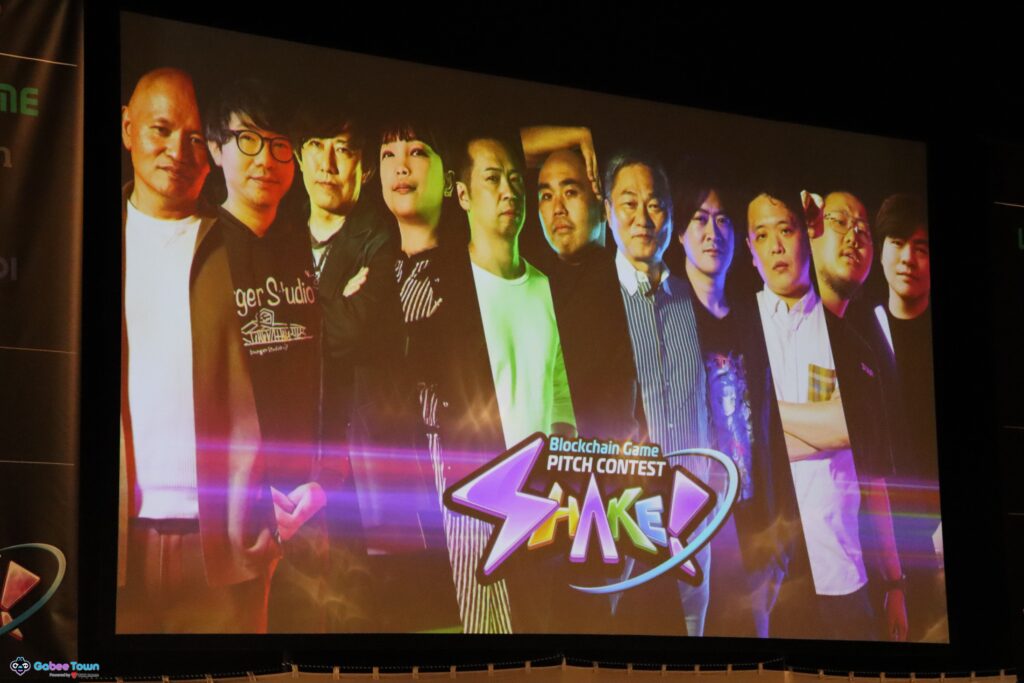

First of all, Mr. Shiino talked about the circumstances that led to the start of the pitch contest “SHAKE! KYOTO” specializing in Web3 games in “IVS Crypto”. In fact, not only for Web3, pitch contests for games are rare in Japan, and it was said that the holding was groping.
“This time, rather than the 1st time, it started with a feeling closer to the 0th time. It was a lot of pressure because I was placed.”
As it was the first time in Crypto Winter, we didn’t make a big announcement, but in the end we received 65 entries from Japan and abroad. From there, the 10 finalists who will appear in the pitch contest will be selected from those based on the idea of making a proposal from now on, those that are developing a beta version, and those that have already been released but are aiming to raise funds for an update. Mr. Shiino said that he selected a wide range of
“What I felt after doing the pitch contest this time was that ‘beating the wall’ was the most important thing for pitching. There are a lot of companies that say, “There are many companies like that. In response to that, the producers of SHAKE!, including myself, supported them, knocked down the walls, and supported them in creating materials, etc. Business planning and business framework creation, etc. are quite deep. I supported you from there.”
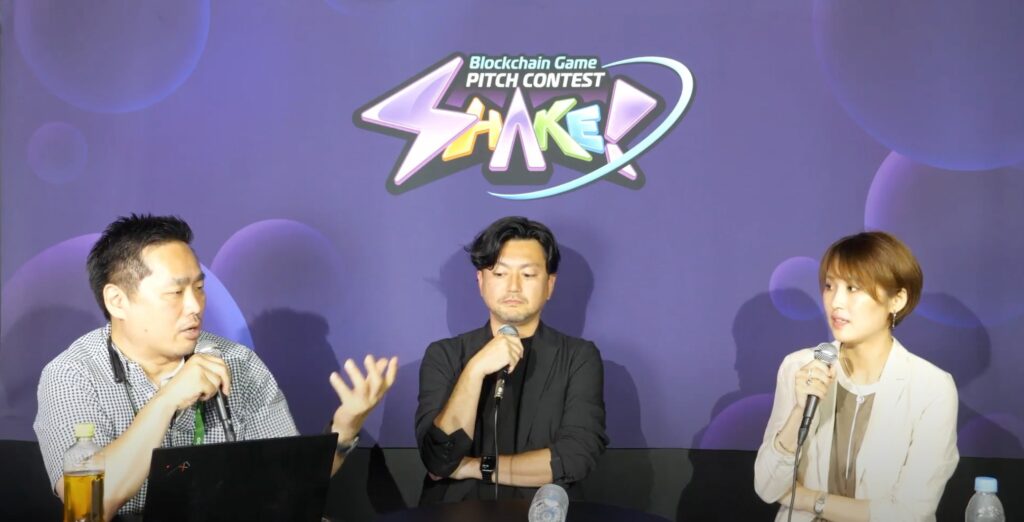
 Mr. Shiino from YGG Japan, Mr. Kaneto from KONAMI, and Kamimoto from CoinDesk JAPAN
Mr. Shiino from YGG Japan, Mr. Kaneto from KONAMI, and Kamimoto from CoinDesk JAPANIn response to Mr. Shiino’s words, KONAMI’s Mr. Kanetomo, who acted as a judge, said, “Of course, the phases of each company are completely different, and the range of projects is wide, and the pitch was impressive. I realized once again how difficult the preparations were.”
Mr. Kanetomo was in charge of the company’s promotions until this spring, but about four years ago he took on a concurrent role and established a blockchain development preparation office. “As you can see from this IVS, Web3 is very popular. It’s no longer the time for me to hold a concurrent position,” he said, devoting himself to Web3 games.
the correct answer has not been determined
The winner of the pitch contest was “Gemina Games” by JP GAMES led by Hajime Tabata, who worked on “Final Fantasy XV”. It was produced using the tool “PEGUSUS WORLD KIT” that the company developed in-house to produce MMORPG. The day after the news release announcing that they had won the top prize in the pitch contest, they received about 60 inquiries.
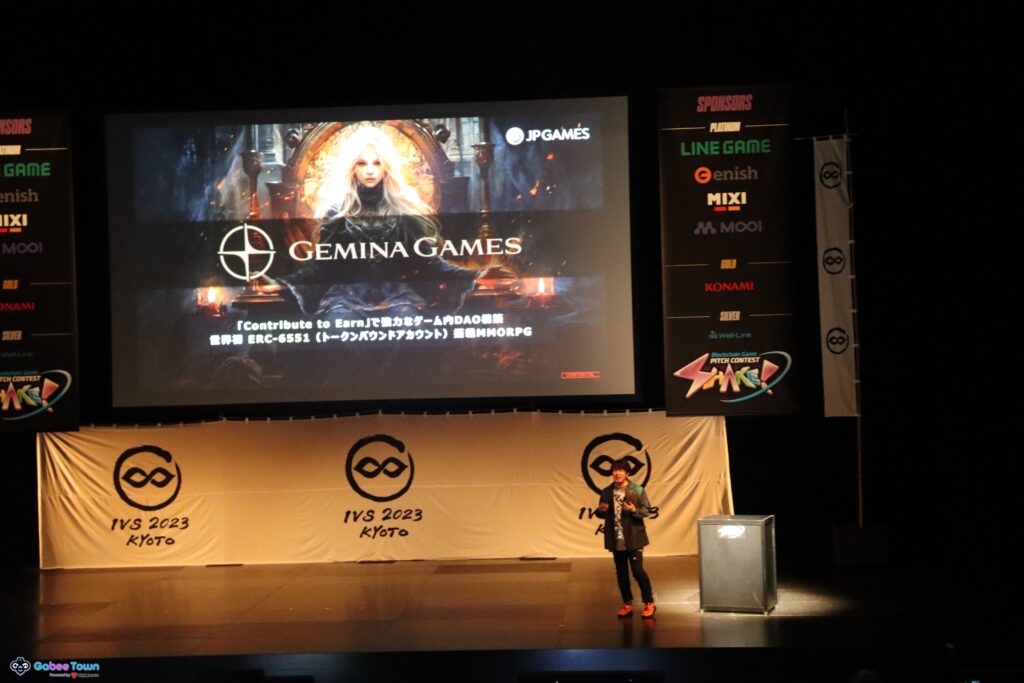

In addition, the KONAMI Award was set up as a special prize at “SHAKE! KYOTO”. Regarding the KONAMI Award, Mr. Kanetomo said, “It was quite difficult to decide what criteria to use. There’s no set correct answer, and each one has a different direction. As for what we evaluated, we focused on connecting with the real world.” said.
“Play games! enrich our lives” by Zeke Games was selected for the KONAMI Award. The service has already been deployed in Taiwan, and NFTs obtained in the game can be exchanged for goods at convenience stores in the real world.
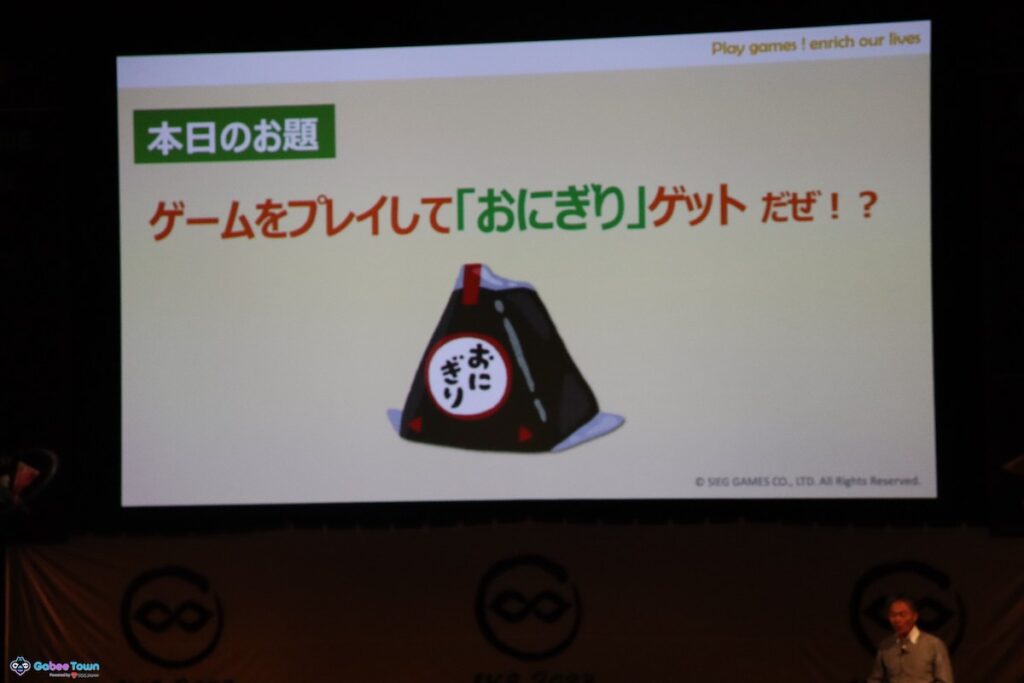

“It was a proposal to bring that to Japan. Games have a large number of users, but until now they were not good at connecting with the outside world, or rather, they were divided. Trying to connect with the real world. was very interesting, and I decided to choose the KONAMI Award with the desire to have a lot of discussions.”
Hot eyes from overseas
At “IVS Crypto 2023”, in addition to the pitch contest “SHAKE! KYOTO”, games occupied a large position, such as a side event of Web3 games held at Nijo Castle. The YGG Group operates more than 10 game-related DAOs (Distributed Autonomous Organizations) around the world, and Shiino says that the group as a whole is often asked to produce quality content from Japan. said and continued:
“In Korea, it is not possible to develop games using blockchain, and in North America, there is a situation where it is difficult to provide services. I think the mood changed during this IVS period, as Web3 games showed a big presence at this IVS Crypto, thinking that it would be better to go to the Japanese market.”
Mr. Kanetomo also commented on the Japanese market, “Until a while ago, most of the games sold in Japan, especially mobile games, were made in Japan. “It’s become the norm, and Web3 games can have that kind of situation from the start.”
When will mass adoption occur?
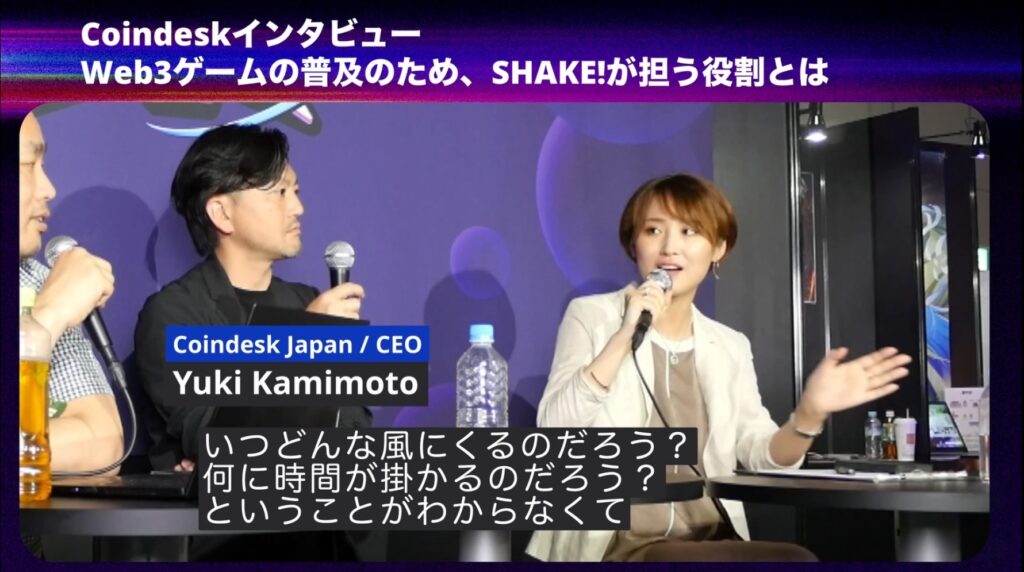

Kamimoto, who acted as moderator, said, “It is said that Web3’s mass adoption will be triggered by games, but when and how will it happen? Although games are said to be the favorite, it is actually taking time. Isn’t it?” questioned the two.
Mr. Kanetomo said that the definition of “mass adoption” itself is ambiguous, but pointed out the current issues.
“I think the challenge is the ecosystem. Everyone is struggling to create an ecosystem within the game.I feel like there are a lot of projects that are trying to build from scratch.A fun and interesting game. Despite the fact that it is extremely difficult to create a Web3 experience, the hurdle is raised by the groping about “What is the Web3 experience?” We believe that there is a way to add and update Web3-like elements in a certain play.It is said that Web3 will spread from games, but it is not necessary to limit it to games.Various industries are trying Web3 For example, an NFT that can be used in a game can be used for other purposes in real life, or can be consumed.A single NFT that goes beyond services , If we can add value that spans multiple services, it could become the first digital data that connects the digital and the real world.”
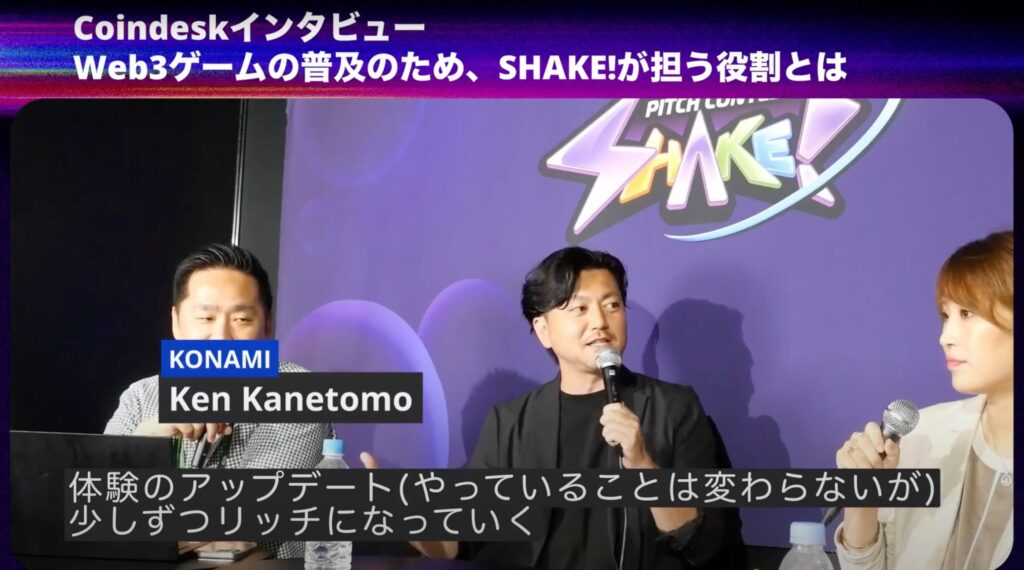

“I think it’s okay to change your perspective instead of being bound by play-to-earn (P2E). If it becomes possible to use it in services, alliances with such companies will be born.Not only can NFTs be used, but if the blockchain accumulates user behavior, it will be possible to see the user’s loyalty in each service. Service providers will be able to express their appreciation for the high level of loyalty of their behavior in places other than billing and LTV.”
Kanetomo said that “experience updates” by Web3 are important, and even if the user’s behavior itself does not change significantly, it can gradually change the behavior to something richer. On the other hand, he added that the service provider will be able to provide something that fits each user.
“We can collaborate with various things such as regions, food, and transportation. Rather than making users go out of their way to do something, we want to take an approach that responds to existing needs.”
Financial Success and Stablecoins
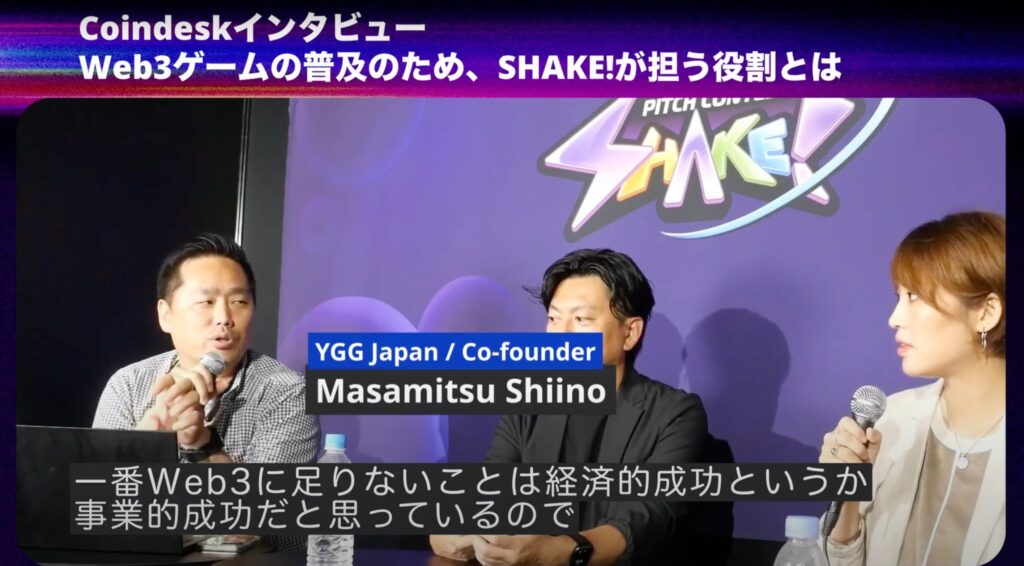

Mr. Shiino also talked about the hurdles for mass adoption.
“Right now, I think the thing that Web3 lacks the most is economic and business success. Games have the highest ability as a cash machine, so the appearance of a game that generates stable sales is one thing. Play-to-earn became popular and sold several tens of billions of yen per month, but it peaked out in two to three months, and now the token is collapsing. If we can achieve sales of 500 million to 1 billion yen per month, including sales from secondary distribution and royalties, the situation will change dramatically.
Kamimoto points out that in Web3 games, in addition to game design, there may be difficulties in handling tokens. He asked if it was realistic to design in-game tokens and also governance tokens.
Mr. Shiino said, “Since we will raise funds with tokens, the story that we have to increase the value of the tokens will destroy the balance because the investors will sell the tokens at the timing of taking profits. In the first place, it is important to control tokens. is difficult, so the trend is changing to the point that we need to think about Web3 games in a different way.”
Mr. Kanetomo also continued, “Fundraising is about the structure of the project, not about the fun of the game. Connecting the two is still a high hurdle.”
So, there is something that the two of them are paying attention to. It’s a stablecoin. First, Mr. Kim said.
“Both tokens and NFTs have volatility. The volatility of NFTs is unavoidable, so the idea of stabilizing the other may not be the correct answer, but it makes it easier to create games. Such a model is Japan. However, it will probably come out next year, and I think that this time, there will be a debate about whether it is okay not to be a token, and various directions will emerge.At least, in Japan, stablecoins will emerge. It is noteworthy that it has become possible to
Mr. Shiino continued, “Stablecoins are very important, and if stablecoins that are easy to use in games appear, it will be easier to do. I have high expectations.”
Wallets are a challenge and an opportunity
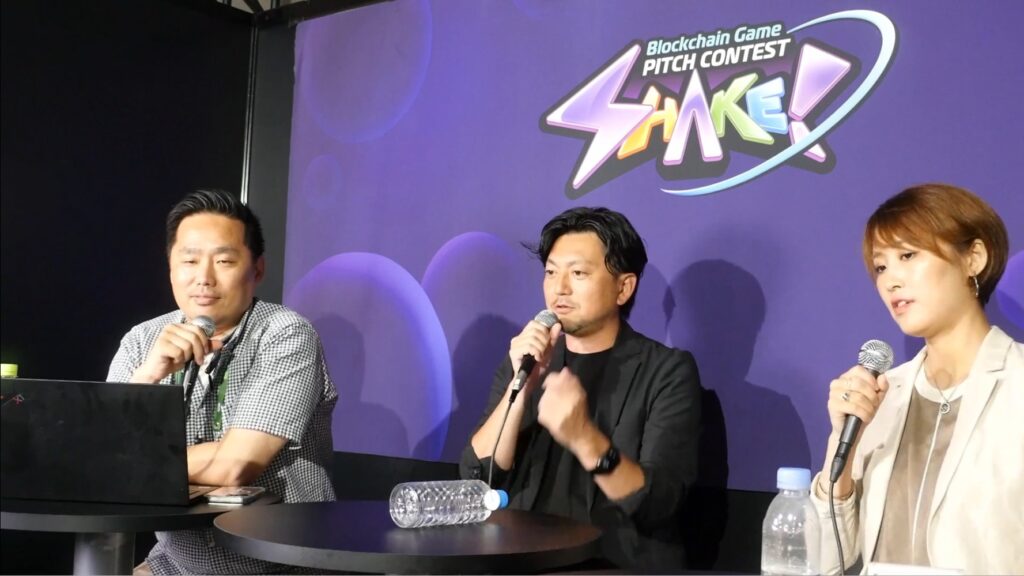

Wallets are equally important to the two who are looking forward to stablecoins. For example, even if stablecoins appear, users will find it difficult to manage if they set up their own wallets for each service.
Mr. Shiino said, “Wallet is where beginners stumble. Web3 is risky and scary.’ How can we get rid of that?”
Mr. Kanetomo said that the point would be to make Web3 invisible to users. “NFTs are game characters and items. Tokens have always been coins and points that can be used in games.” Until then, if UI/UX evolves, psychological hurdles will disappear.
The issue is how long it will take for UI/UX to evolve and the user’s psychological hurdles to disappear, but Mr. Kanetomo continued that there is another approach.
“Paradoxically, there are a certain number of crypto asset holders in Japan. If the content is penetrating, it should be able to go beyond the boundaries of existing game users. He said that there should be two approaches: the evolution of UI/UX that is close to the user and the penetrating and interesting content.
Certainly, if you are a crypto asset holder, the psychological hurdles to setting up a wallet will be low. Mr. Shiino said, “Pokémon cards are mixed with people who enjoy playing with the cards themselves and those who play with them as an investment. However, as a whole, the Pokémon cards are very exciting. You can make a movement,” he continued.
The future of Web3 games in Japan
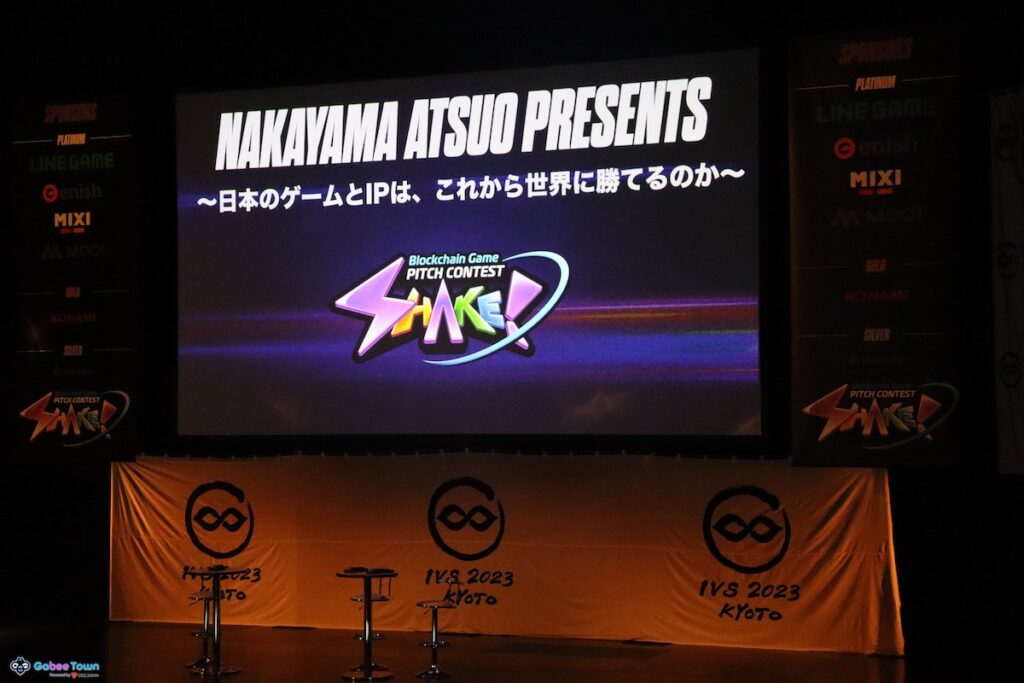

A session with Mr. Kanetomo and Mr. Shiino, who touched on various topics such as behind the scenes of the pitch contest, evaluation criteria, attention from overseas, the period of mass adoption, stable coins and wallets. There was also an interesting remark about IP (intellectual property).
To briefly touch on IP, the most important thing for IP is to value existing fans, and from that perspective, Web3 games are “non-IP”, that is, to create new forms with new IP. The two believe that is realistic.
Finally, we asked about their respective positions and roles in Japanese Web3 games, and the future development of Japanese Web3 games.
Mr. Shiino said, “Our role is to supply the materials necessary for success.”
“We don’t make games ourselves, such as global partnerships, funding, etc., but we will provide the necessary things to those who are trying to make games. We will also be in charge of marketing. ) I think it’s a position to make a pickaxe.”
YGG Japan will start in May 2022. In just over a year, the situation has changed dramatically.
“At this time last year, we were in a situation where we were considering whether or not we should consider it, but now we have almost finished considering it, have started to move, and are in a situation where we are ascertaining the phase of producing results.”
“There should be quite a few Web3 games around the Tokyo Game Show (September 21-24). I expect this year’s Tokyo Game Show to be the first Web3 year.”
Looking back on his involvement with Web3, Mr. Kanetomo said:
“When I first saw ‘CryptoKitties’ around 2018 or 2019, I felt that if the concept of NFTs entered the game, the entire gaming experience would change. Maybe in a year or two. I was so impatient that I might be in that kind of world, so I created a new department and started research and development, even though I didn’t know. It can be said that it was good to be able to do it, but I also feel that it is taking too long.After all, external factors such as Crypto Winter are also important.However, the momentum itself is getting stronger and stronger, so when will a big title come out? I think we are in a strange situation.”
“Mobile games are coming out and the whole market is booming. Consoles are also hot. Rather than shifting the economy around those games to Web3, the Web3 gaming experience will be updated and attract more attention, and users will I honestly don’t know when (hit = mass adoption) will come, but we want to aim for the first hit. I want to do my best.”
Mr. Shiino said, “I think that some of the content released by major companies will be successful in some way.” I am looking forward to it,” he said.
“The other point is whether Japanese content will succeed or whether overseas content will succeed. Right now, Korean games are focusing on Japan as a market.However, personally, the first hit will be China and South Korea are currently dominating the market for Web2 games and social games, but if Web3 games are the first to become hits and become the standard, Japan I really want Japanese game companies to do their best.”
|Text: Takayuki Masuda
|Image: YGG Japan
The post When are Web3 games coming? ──Mass adoption, attention from overseas, stablecoins…One hour talking about the present and future of Japanese Web3 games | CoinDesk JAPAN | Coin Desk Japan appeared first on Our Bitcoin News.

 2 years ago
143
2 years ago
143














 English (US) ·
English (US) ·